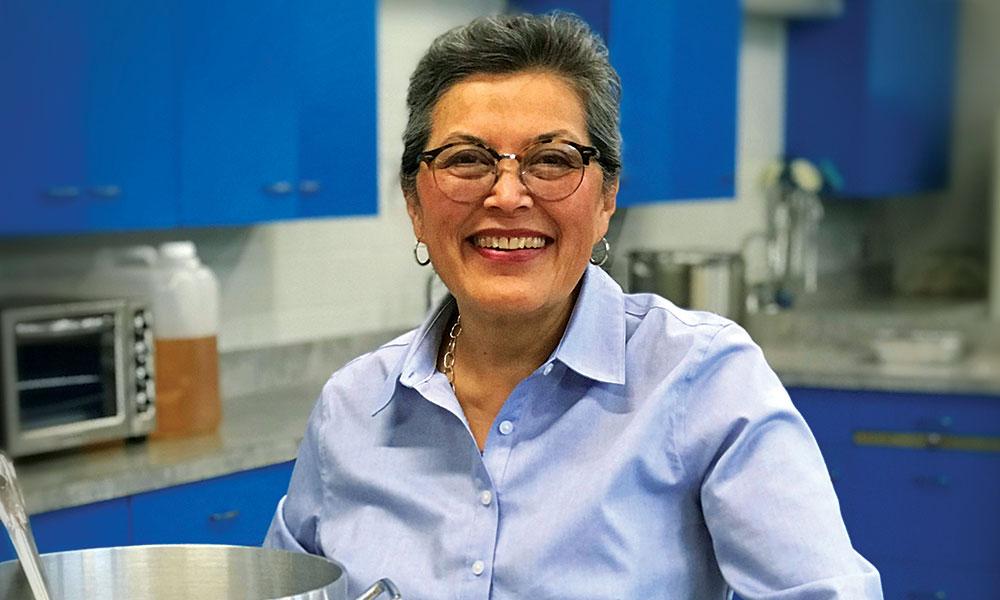
Holy Moley! 1,000 Enchiladas
Hilda is ‘home doing work I want to do with Catholic Charities’
Hilda is ‘home doing work I want to do with Catholic Charities’
Anyone who has ever cooked for a large group knows that it is time-consuming, and certainly exhausting. But how about cooking for a crowd of 1,000? No, that’s not a typo, and it’s also no problem for Hilda McShane, a 30-year volunteer at Catholic Charities of Shiawassee and Genesee Counties. Because of the COVID-19 pandemic this year and the restrictions that accompanied it, Hilda singlehandedly made 1,000 enchiladas for a Catholic Charities fundraiser.
“I’ve done parties with 300 people; another 700 is nothing,” Hilda jokes.
In February, Hilda and a fellow volunteer started making enchiladas in the Catholic Charities kitchen. But when Michigan’s stay-at-home order was implemented, Hilda decided to continue cooking on her own. After all, these enchiladas were for the Holy Moley drive-thru fundraiser for Cinco de Mayo, with all proceeds going to Catholic Charities.
“It has been a difficult time, but I thought through how to cook these safely for the Livingston community, and things fell into place,” Hilda explains.
Why Holy Moley? This is the name of Hilda’s signature homemade enchilada sauce recipe. Hilda grew up in Bay City, eating traditional Mexican food. Over the years, she’s tweaked her family’s enchilada sauce recipe, serving it at gatherings and parties, but she longed to do something truly special with the sauce.
Three years ago, Hilda approached Catholic Charities about a Lenten Friday fundraiser, selling cheese enchiladas coated in her “Holy Moley” sauce, with a side of rice and beans. The fundraiser was a hit, and community members keep coming back for more. This year, for Cinco de Mayo, Hilda added beef and chicken to the cheese enchiladas with her special sauce, for hundreds of lucky drive-thru customers.
The daughter of two migrant workers from Texas, Hilda McShane grew up performing migrant work herself, picking tomatoes, green beans, melons and squash. She eventually earned a degree in business, with an emphasis in marketing. She worked with the Flint Journal, Genesee County Parks and the Genesee County Health Department before God steered her in a new direction – one that involved getting back to her roots of cooking traditional Mexican food.
With the success of the Catholic Charities fundraisers, Hilda thought: “Why settle for a fundraiser once a year? My goal is to develop a sauce we can market and sell, with a portion of the profits going back to Catholic Charities.”
This idea started at the time of the first fundraiser, when she had difficulty getting the main ingredient for her sauce: chili anchoes, or dried poblano peppers. She did track down enough peppers for the enchiladas, but she began researching why Michigan doesn’t produce poblano pepper. Her search led her to Ben Phillips, from Michigan State University Extension’s vegetable production team. Ben then got approval from MSU’s AgBioResearch Center to locally test-grow a variety of poblano peppers.
“One of the reasons they moved forward is Ben discovered Michigan is on the same latitude as Hungary, and one of Hungary’s main exports is Hungarian peppers,” Hilda says.
With Ben’s connection to Michigan farmers, he contacted John Leaman of Leaman’s Green Applebarn in Freeland, who had purchased a commercial dehydrator and was looking for additional products to dehydrate, Hilda explains.
The orchard dried the vegetables, and at the end of the trial growing season, Hilda took the peppers back to Catholic Charities to be cleaned, weighed and sorted. The cleaned peppers were then taken to the Genesee Career Institute, where the culinary school used Hilda’s recipe to make enchilada sauce.
The group held two taste trials – one at the Genesee Career Institute and one at the Saginaw Farmers Market. Powers Catholic High School student Isaac Dixon input the data, and MSU analyzed the results. The sauce with Michigan peppers performed better than the sauce with southwest peppers.
Throughout this process, and whenever Hilda is at a standstill, she asks God for guidance on the next steps. She also gets inspiration from the homilies she hears at St. Pius X in Flint.
“It’s really about having a lot of faith and listening to God’s message,” she says. “Throughout this whole journey, I was led to various organizations and individuals by asking the question, ‘What next, God?’ I always get an answer. It’s so simple. You just ask and listen to him.”
To ensure the project’s success, you need a lot of hands in the kitchen, which is why Hilda tapped into the resources she has: family. Her son, who has a background in graphic design and marketing, and her husband, an accountant, have also used their God-given tools to help.
Hilda says, “Wouldn’t it be great, throughout all of this, if we could develop a pepper grown in Michigan? It would be a new product for the state and new jobs. It would also be a new taste for chili ancho in the world market.”
But in the meantime, Hilda’s sauce and enchiladas continue to be a treat for her local community, and for Catholic Charities. As Hilda says: "Now, I'm home doing work I want to do with Catholic Charities.”
